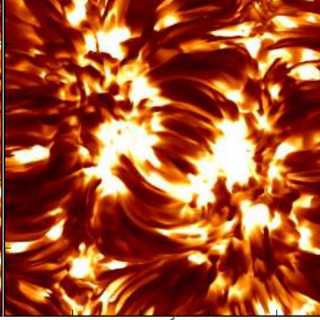Bibcode
Asensio Ramos, A.
Bibliographical reference
The Astrophysical Journal, Volume 690, Issue 1, pp. 416-426 (2009).
Advertised on:
1
2009
Journal
Citations
3
Refereed citations
3
Description
The near-IR line of Mn I at 15262.7 Å has recently been proposed
as a new tool for diagnosing the magnetic field strength and magnetic
energy density associated with unresolved magnetic structures, due to
the enhanced sensitivity of the Stokes I profile. In this paper, the
behavior of the line, focusing on the properties of the Stokes I
profile, is analyzed in detail with the aid of state-of-the-art
magneto-hydrodynamical simulations of the solar surface convection. The
line is synthesized taking into account that the splitting and the
strength of the Zeeman components have to be calculated under the
framework of the Paschen-Back theory via the numerical diagonalization
of the total Hamiltonian, including the hyperfine and Zeeman
contributions. The peak ratio and separation of the blue and red lobes
of the emergent Stokes I profile are shown to be correlated with the
magnetic field strength when no smearing is taken into account, while
the correlation slightly degrades when diffraction and stray-light
contamination is accounted for. We also analyze the dependence of the
first two line moments with the magnetic field, showing that the first
and second moments can be used to trace the velocity and the magnetic
field strength, respectively. This correlation is still maintained for
ground-based observations.
Related projects

Magnetism, Polarization and Radiative Transfer in Astrophysics
Magnetic fields pervade all astrophysical plasmas and govern most of the variability in the Universe at intermediate time scales. They are present in stars across the whole Hertzsprung-Russell diagram, in galaxies, and even perhaps in the intergalactic medium. Polarized light provides the most reliable source of information at our disposal for the
Tanausú del
Pino Alemán